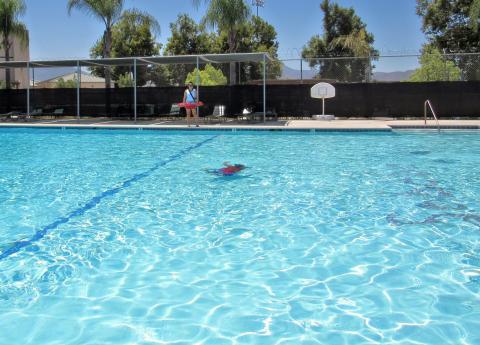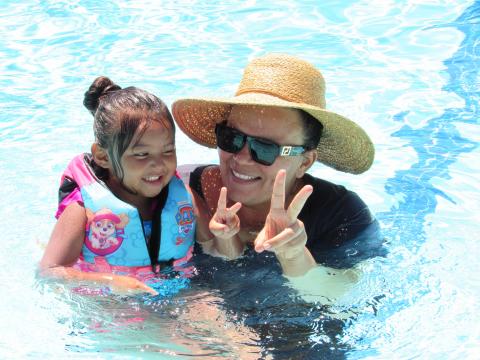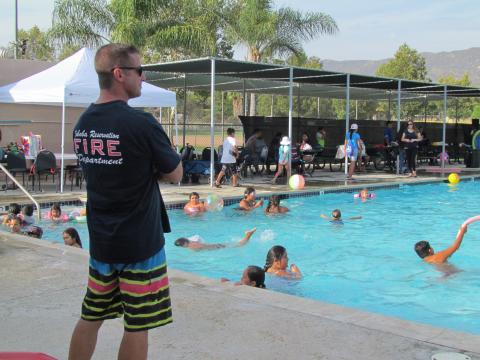When the Soboba Band of Luiseño Indians Tribal Administration decided to have a safe reopening of its Sports Complex pool on July 6, luckily there were four lifeguards who had recently completed certification that could be on duty.
The pool is open for three sessions per weekday from 11 a.m. to 6:30 p.m. There is a limit of 30 people each session. Lifeguards take the temperature of each person as they arrive, and all visitors are required to wear masks when outside of the pool. After each session, everyone is asked to leave the pool area and the area undergoes a 30-minute cleaning routine.
Soboba Fire Department Firefighter/EMT Robert Cisneros and Firefighter Paramedic Mike Chidester were trained as lifeguards and instructors in June of 2019 and rotated shifts at the Sports Complex pool. This came after a request by Soboba Parks and Recreation Director Andy Silvas to put together a program that would benefit the center.
“I was asked to coordinate training, certification and pool coverage scheduling,” Cisneros said. “I was asked to run it due to my history of swift water rescue, 21 years of paramedic experience and willingness to accept the challenge.”
He had never been certified as a lifeguard but was very comfortable in the water from many hours he spent in pools recreationally.
After a busy summer last year, it was realized that due to the work and personal schedules of fire department employees, more people needed to be certified; not just for daily open swim times but for after-hours private parties as well. Silvas obtained Tribal Council approval and additional funding for six more positions and four were certified. They are Sports Complex employees Ricardo Macias, Avellaka Arviso, Lawrence (Marshal) Oguinn and Julissa Ledesma. Firefighter Paramedic Keith Navarre recently completed the course and another one is set to be certified before next month.
“Navarre has been an ocean lifeguard in Orange County for 15 years; he’s a great addition to our crew,” Cisneros said.
Applicants didn’t need prior experience, but they had to complete a rigorous swim test prior to completion. It included swimming nonstop laps for a total of 300 yards (12 laps in a 75’ pool), treading water for five minutes and, starting at the shallow end swim to the deep end and retrieve a 10-pound weight from the bottom of the pool and return it to the shallow end.
Arviso, who works most afternoon shifts at the pool, said that was the most challenging part of the entire certification process. She said the program’s timing was great as she plans to work as a lifeguard all summer before heading to college on September 1.
She is attending Dean College in Massachusetts as a pre-law student enrolled in the school’s 3+3 program that enables students to study for three years at Dean College and then enter law school. Students earn their bachelor’s degree after completing their first year of law school. Arviso earned a softball scholarship so she will also be part of the school’s outstanding athletic program.
“One of the best skills to have as a lifeguard is to be able to make quick decisions and to know what to do in a certain situation,” said Arviso, 20.
Another important aspect of the certification process is the classroom portion which includes studying a 500+ page lifeguard manual, completing 10 online tests with a score of 90% or better, plus first aid and CPR. The online tests include approximately 800 questions.
“We provide the hands-on classroom skills and then move to the pool for them to learn approximately 60 skills that all have to be demonstrated for competency,” Cisneros said.
He said that after students set up an online profile on Lifeguard-Pro.org the entire curriculum is laid out in detail. The initial manual review and online test completion is assigned to each person to do in their own time, but within two weeks. This also includes watching videos of the in-water skills.
“After that, we meet in the classroom and demonstrate first aid, CPR, and back boarding. The students then take the online first aid and CPR tests and we schedule an eight-hour pool skills day. It usually takes all day,” Cisneros said.
Upon successful completion of the in-pool skills, students return to the classroom and take a 60-question written final encompassing all aspects of the written and hands-on curriculum. Currently, all new lifeguards are only working at the Soboba Sports Complex pool, but the certification is internationally recognized and can be used anywhere a lifeguard is needed.
Soboba’s pool guidelines require a lifeguard on duty but usually two are scheduled for each session. On a recent weekday, Kelli Hurtado was at the pool with her daughter, granddaughter and niece. She was glad the pool has reopened.
“There is nothing else to do when it’s so hot,” she said. “My granddaughter has a little pool at home but it’s not the same.”
Photos courtesy of the Soboba Band of Luiseño Indians





